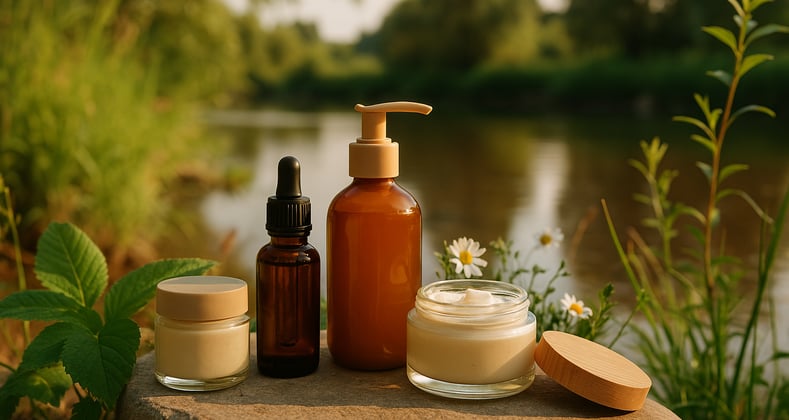Does Organic Really Mean Better for Skin? The Truth
Curious if organic skincare is actually better for your skin? Learn the facts behind the label, its pros and cons, and how to choose what’s right for you.
4/8/20253 min read
🚀 Introduction: The Rise of Organic Skincare
Over the past decade, the word "organic" has become the crown jewel of beauty marketing. Skincare shelves are overflowing with organic creams, cleansers, and serums that promise to be safer, cleaner, and more effective. But what does "organic" really mean in the context of skincare? More importantly—does organic skincare actually work better for your skin?
In this article, we’ll uncover the truth behind organic skincare: what it means, what it doesn’t, and how to decide whether it’s the best choice for your unique skin needs.
🌱 What Does “Organic” Skincare Actually Mean?
🤔 Definitions Matter
Certified Organic: Products that meet specific certification standards (like USDA Organic or COSMOS Organic) must contain a high percentage of organically farmed ingredients and avoid synthetic chemicals.
Natural vs. Organic: "Natural" means the ingredient is derived from a natural source, but it doesn't guarantee it was grown without pesticides. "Organic" implies no synthetic fertilizers, GMOs, or pesticides were used.
Clean Beauty vs. Organic: Clean beauty refers to products that avoid certain controversial chemicals, but they may or may not be organic.
🧴 Greenwashing Alert
Many brands use "organic" or "natural" loosely without proper certifications. Always look for verifiable logos like:
USDA Organic
COSMOS Organic
ECOCERT
✅ Pros of Organic Skincare
1. Fewer Harsh Chemicals
Organic products tend to avoid parabens, phthalates, sulfates, and artificial fragrances—all known skin irritants, especially for sensitive or acne-prone skin.
2. Gentler on the Skin
Ingredients like aloe vera, shea butter, jojoba oil, and green tea are commonly found in organic skincare and are well-tolerated by most skin types.
3. Environmentally Friendly
Organic farming supports biodiversity, avoids harmful pesticides, and often uses sustainable harvesting practices.
4. Cruelty-Free + Ethical Packaging
Many organic skincare brands commit to zero animal testing and eco-conscious packaging (glass jars, refill systems, recycled materials).
❌ Cons and Common Misconceptions
1. Not Always Irritation-Free
Organic doesn’t mean hypoallergenic. Some organic products use potent essential oils or botanicals that can cause reactions—especially for sensitive skin.
2. Shorter Shelf Life
Without strong preservatives, some organic skincare products expire faster or become contaminated.
3. “Natural” Doesn’t Mean Better
Some natural ingredients can be more irritating than synthetic ones. For example, citrus oils or raw vinegar can be harsh on the skin.
4. Price Tag ≠ Effectiveness
Organic skincare often comes at a higher cost, but that doesn’t always mean it’s more effective.
💡 Does Organic = Better for Your Skin?
It depends. Skin type, sensitivity, lifestyle, and personal ethics all play a role. Here's a quick guide:
Sensitive Skin: May benefit from organic products free of artificial fragrance and alcohol.
Acne-Prone Skin: Can respond well to organic anti-inflammatory ingredients like green tea or aloe—but beware of comedogenic oils.
Oily Skin: Look for lightweight, non-comedogenic oils like grapeseed or jojoba.
Dry Skin: Rich butters like shea or cocoa can deeply moisturize—but watch for allergens.
🔍 Pro Tip: Always patch test a new product, organic or not, before applying it all over your face.
⚠️ Red Flags in Organic Skincare
No certification listed on packaging
Overloaded with essential oils
Buzzwords like “chemical-free” (everything is made of chemicals!)
Products that skip all preservatives (risk of spoilage or bacterial growth)
💸 When It Might Be Worth the Investment
If you have allergy-prone or reactive skin, minimizing exposure to synthetic chemicals can help.
If you’re committed to sustainability, organic farming practices align with eco-conscious living.
If you want a cleaner ingredient list, certified organic products are more transparent.
🌍 Recommended Organic Skincare Brands (US + UK)
Green People – Certified organic and cruelty-free, with a full men's range
Pai Skincare – Formulated for sensitive skin, Soil Association certified
UpCircle Beauty – Affordable, upcycled ingredients, widely available in both countries
Juice Beauty – Based in California, known for USDA-certified skincare
Neal's Yard Remedies – Pioneers in organic apothecary-style skincare
🧼 Bottom Line: Is Organic Skincare Better?
Yes—and no.
Organic skincare has its perks: cleaner ingredients, sustainable sourcing, and fewer synthetic irritants. But "organic" doesn’t always equal safer or more effective. The key is to:
Understand your skin type
Read the ingredient list, not just the label
Look for certifications
Patch test everything
✅ Conclusion: Be a Smart Skincare Shopper
“Organic” isn’t a guarantee—it’s a starting point. If it aligns with your skin needs and values, great. If not, that’s okay too.
The real secret to healthy skin? Education, consistency, and knowing what works for YOU.


Empowering men with sustainable beauty advice daily.
Contact
info@greenswagger.co.uk
© 2025 All rights reserved.


